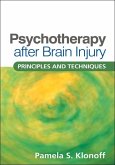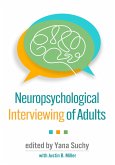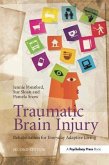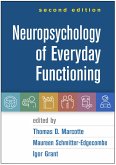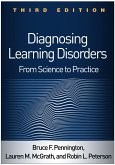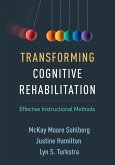Assessment of Feigned Cognitive Impairment
A Neuropsychological Perspective
Herausgeber: Boone, Kyle Brauer
Assessment of Feigned Cognitive Impairment
A Neuropsychological Perspective
Herausgeber: Boone, Kyle Brauer
- Gebundenes Buch
- Merkliste
- Auf die Merkliste
- Bewerten Bewerten
- Teilen
- Produkt teilen
- Produkterinnerung
- Produkterinnerung
The go-to resource for clinical and forensic practice has now been significantly revised with 85% new material, reflecting the tremendous growth of the field. Leading authorities synthesize the state of the science on symptom feigning in cognitive testing and present evidence-based recommendations for distinguishing between credible and noncredible performance.
Andere Kunden interessierten sich auch für
![Psychotherapy after Brain Injury Psychotherapy after Brain Injury]() Pamela S. Klonoff (Barrow Neurological Institute and Dignity HealthPsychotherapy after Brain Injury73,99 €
Pamela S. Klonoff (Barrow Neurological Institute and Dignity HealthPsychotherapy after Brain Injury73,99 €![Neuropsychological Interviewing of Adults Neuropsychological Interviewing of Adults]() Neuropsychological Interviewing of Adults65,99 €
Neuropsychological Interviewing of Adults65,99 €![Traumatic Brain Injury Traumatic Brain Injury]() Jennie PonsfordTraumatic Brain Injury59,99 €
Jennie PonsfordTraumatic Brain Injury59,99 €![Neuropsychology of Everyday Functioning, Second Edition Neuropsychology of Everyday Functioning, Second Edition]() Neuropsychology of Everyday Functioning, Second Edition109,99 €
Neuropsychology of Everyday Functioning, Second Edition109,99 €![Diagnosing Learning Disorders Diagnosing Learning Disorders]() Bruce F. PenningtonDiagnosing Learning Disorders53,99 €
Bruce F. PenningtonDiagnosing Learning Disorders53,99 €![Rare Conditions, Diagnostic Challenges, and Controversies in Clinical Neuropsychology Rare Conditions, Diagnostic Challenges, and Controversies in Clinical Neuropsychology]() Rare Conditions, Diagnostic Challenges, and Controversies in Clinical Neuropsychology45,99 €
Rare Conditions, Diagnostic Challenges, and Controversies in Clinical Neuropsychology45,99 €![Transforming Cognitive Rehabilitation Transforming Cognitive Rehabilitation]() McKay Moore Sohlberg (United States University of Oregon)Transforming Cognitive Rehabilitation71,99 €
McKay Moore Sohlberg (United States University of Oregon)Transforming Cognitive Rehabilitation71,99 €-
-
The go-to resource for clinical and forensic practice has now been significantly revised with 85% new material, reflecting the tremendous growth of the field. Leading authorities synthesize the state of the science on symptom feigning in cognitive testing and present evidence-based recommendations for distinguishing between credible and noncredible performance.
Hinweis: Dieser Artikel kann nur an eine deutsche Lieferadresse ausgeliefert werden.
Hinweis: Dieser Artikel kann nur an eine deutsche Lieferadresse ausgeliefert werden.
Produktdetails
- Produktdetails
- Evidence-Based Practice in Neuropsychology
- Verlag: Guilford Publications
- 2 ed
- Seitenzahl: 710
- Erscheinungstermin: 4. Juni 2021
- Englisch
- Abmessung: 259mm x 182mm x 43mm
- Gewicht: 1450g
- ISBN-13: 9781462545551
- ISBN-10: 1462545556
- Artikelnr.: 59992266
- Herstellerkennzeichnung
- Libri GmbH
- Europaallee 1
- 36244 Bad Hersfeld
- gpsr@libri.de
- Evidence-Based Practice in Neuropsychology
- Verlag: Guilford Publications
- 2 ed
- Seitenzahl: 710
- Erscheinungstermin: 4. Juni 2021
- Englisch
- Abmessung: 259mm x 182mm x 43mm
- Gewicht: 1450g
- ISBN-13: 9781462545551
- ISBN-10: 1462545556
- Artikelnr.: 59992266
- Herstellerkennzeichnung
- Libri GmbH
- Europaallee 1
- 36244 Bad Hersfeld
- gpsr@libri.de
Kyle Brauer Boone, PhD, ABPP, ABCN, has a private practice in Torrance, California, and is Clinical Professor in the Department of Psychiatry and Biobehavioral Sciences at the University of California, Los Angeles. She has published six books and over 125 peer-reviewed research articles, including many in the area of development and validation of tests to detect feigned cognitive symptoms. She has also published two tests used to assess for performance validity on neuropsychological exams: the b Test and the Dot Counting Test. Dr. Boone served on the committee that developed the practice guidelines for clinical neuropsychology published by the American Academy of Clinical Neuropsychology in 2007, and she was an invited attendee of the 25-member consensus conference that developed the practice guidelines for the use of neurocognitive performance validity tests published by the American Academy of Clinical Neuropsychology in 2009 and updated in 2021. She is board certified through the American Board of Clinical Neuropsychology, is a Fellow of the American Psychological Association, and is the 2020 recipient of the Ralph M. Reitan Award for Clinical Excellence from the National Academy of Neuropsychology.
I. Performance and Symptom Validity Tests 1. Clinician's Guide to Navigating Performance Validity Testing
Maria E. Cottingham 2. Design Methods in Neuropsychological Performance Validity
Symptom Validity
and Malingering Research
Ryan W. Schroeder
Kyle Brauer Boone
& Glenn J. Larrabee 3. Forced-Choice Performance Validity Tests
Ryan W. Schroeder & Phillip K. Martin 4. Alternatives to Forced-Choice Performance Validity Tests
Stephen R. Nitch
Alexis S. Rosen
Laurel A. Mattos
Scott Roye
& David M. Glassmire 5. Intelligence Tests as Performance Validity Measures
Natalie Sobel
Talin Babikian
& Kyle Brauer Boone 6. Performance Validity Tests in Cognitive Screening Instruments and Computerized Assessment Tools
Patrick Armistead-Jehle & Robert D. Shura 7. Embedded Performance Validity Scores in Standard Memory Tests
Bradley N. Axelrod
Justin B. Miller
& Jennifer LaBuda 8. Validity Indicators within Executive Function Measures: Use and Limits in Detection of Response Validity
Nathaniel W. Nelson
Catherine Lee
& Jerry J. Sweet 9. Motor and Sensory Tests as Measures of Performance Validity
Ginger Arnold & Kyle Brauer Boone 10. The Use of Visual Spatial Performance Validity Tests in Detecting Noncredible Performance
Douglas M. Whiteside
Lauren E. Piper
Michael R. Basso
& Kyle Brauer Boone 11. Information Processing Speed Tests as Performance Validity Tests
Laszlo A. Erdodi & Jonathan D. Lichtenstein 12. Language Tests as Performance Validity Tests
Phillip K. Martin & Ryan W. Schroeder 13. Effects of Premorbid Ability
Neuropsychological Impairment
and Invalid Test Performance on the Frequency of Low Scores
Martin L. Rohling
Jennifer Langhinrichsen-Rohling
& John E. Meyers 14. Interpretation of Data from Multiple Performance Validity Tests
Jeremy J. Davis 15. Using the MMPI-2-RF as an Aid in the Detection of Noncredible Neurocognitive Presentations
Maria E. Cottingham
Kyle Brauer Boone
Hope E. Goldberg
Tara L. Victor
Michelle A. Zeller
Medina R. Baumgart
J. Brandon Birath
& Matthew J. Wright 16. Utility of the Personality Assessment Inventory in Evaluating Symptom Validity in the Context of Neuropsychological Evaluation
Owen J. Gaasedelen
Douglas M. Whiteside
& Kyle Brauer Boone II. Use of Performance Validity Tests in Various Populations 17. Base Rates of Feigned Mild Traumatic Brain Injury
Kyle Brauer Boone
Pavel Litvin
& Tara L. Victor 18. Noncredible Presentations in Neuropsychological Assessment of Pain- and Fatigue-Related Disorders: Clinical and Research Implications
Julie A. Suhr & Andrew Bryant 19. The Impact of Psychotic
Depressive
Bipolar
Obsessive-Compulsive
and Anxiety Disorders on Performance Validity Test Results
Hope E. Goldberg & J. Brandon Birath 20. Performance Validity in Somatoform/Conversion Disorders
Factitious Disorder
and Malingering: Do We Need a New Diagnostic Schema?
Kyle Brauer Boone 21. Identification of Feigned Intellectual Disability
Tara L. Victor & Kyle Brauer Boone 22. Performance Validity Testing in Patients with Dementia
Kirsty E. Bortnik & Andy C. Dean 23. Performance Validity Tests in the Epilepsy Clinic
Daniel L. Drane
David J. Williamson
Kelsey Hewitt
& Taylor Jordan 24. Use of Performance Validity Tests and Symptom Validity Tests in Assessment of Specific Learning Disorders and Attention-Deficit/Hyperactivity Disorder
Allyson G. Harrison
Grace Jin Lee
& Julie A. Suhr 25. Toxic Mold Syndrome and Multiple Chemical Sensitivity: The Continued Search for a Causal Link to Neuropsychological Functioning
Robert J. McCaffrey & Julie K. Lynch 26. The Use of Performance Validity Tests in Ethnic-Minority and Non-English-Dominant Populations
Xavier F. Salazar
Po H. Lu
& Kyle Brauer Boone 27. Performance/Symptom Validity Test Use with Active Duty Service Members and Veterans
Patrick Armistead-Jehle
Douglas B. Cooper
Heather G. Belanger
Jason R. Soble
& Nathanial W. Nelson 28. Validity Assessment in Pediatric Populations
Alison M. Colbert
Emily C. Maxwell
& Michael W. Kirkwood 29. Assessment of Feigned Cognitive Impairment in Criminal Forensic Neuropsychological Settings
Robert L. Denney & Rachel L. Fazio Index
Maria E. Cottingham 2. Design Methods in Neuropsychological Performance Validity
Symptom Validity
and Malingering Research
Ryan W. Schroeder
Kyle Brauer Boone
& Glenn J. Larrabee 3. Forced-Choice Performance Validity Tests
Ryan W. Schroeder & Phillip K. Martin 4. Alternatives to Forced-Choice Performance Validity Tests
Stephen R. Nitch
Alexis S. Rosen
Laurel A. Mattos
Scott Roye
& David M. Glassmire 5. Intelligence Tests as Performance Validity Measures
Natalie Sobel
Talin Babikian
& Kyle Brauer Boone 6. Performance Validity Tests in Cognitive Screening Instruments and Computerized Assessment Tools
Patrick Armistead-Jehle & Robert D. Shura 7. Embedded Performance Validity Scores in Standard Memory Tests
Bradley N. Axelrod
Justin B. Miller
& Jennifer LaBuda 8. Validity Indicators within Executive Function Measures: Use and Limits in Detection of Response Validity
Nathaniel W. Nelson
Catherine Lee
& Jerry J. Sweet 9. Motor and Sensory Tests as Measures of Performance Validity
Ginger Arnold & Kyle Brauer Boone 10. The Use of Visual Spatial Performance Validity Tests in Detecting Noncredible Performance
Douglas M. Whiteside
Lauren E. Piper
Michael R. Basso
& Kyle Brauer Boone 11. Information Processing Speed Tests as Performance Validity Tests
Laszlo A. Erdodi & Jonathan D. Lichtenstein 12. Language Tests as Performance Validity Tests
Phillip K. Martin & Ryan W. Schroeder 13. Effects of Premorbid Ability
Neuropsychological Impairment
and Invalid Test Performance on the Frequency of Low Scores
Martin L. Rohling
Jennifer Langhinrichsen-Rohling
& John E. Meyers 14. Interpretation of Data from Multiple Performance Validity Tests
Jeremy J. Davis 15. Using the MMPI-2-RF as an Aid in the Detection of Noncredible Neurocognitive Presentations
Maria E. Cottingham
Kyle Brauer Boone
Hope E. Goldberg
Tara L. Victor
Michelle A. Zeller
Medina R. Baumgart
J. Brandon Birath
& Matthew J. Wright 16. Utility of the Personality Assessment Inventory in Evaluating Symptom Validity in the Context of Neuropsychological Evaluation
Owen J. Gaasedelen
Douglas M. Whiteside
& Kyle Brauer Boone II. Use of Performance Validity Tests in Various Populations 17. Base Rates of Feigned Mild Traumatic Brain Injury
Kyle Brauer Boone
Pavel Litvin
& Tara L. Victor 18. Noncredible Presentations in Neuropsychological Assessment of Pain- and Fatigue-Related Disorders: Clinical and Research Implications
Julie A. Suhr & Andrew Bryant 19. The Impact of Psychotic
Depressive
Bipolar
Obsessive-Compulsive
and Anxiety Disorders on Performance Validity Test Results
Hope E. Goldberg & J. Brandon Birath 20. Performance Validity in Somatoform/Conversion Disorders
Factitious Disorder
and Malingering: Do We Need a New Diagnostic Schema?
Kyle Brauer Boone 21. Identification of Feigned Intellectual Disability
Tara L. Victor & Kyle Brauer Boone 22. Performance Validity Testing in Patients with Dementia
Kirsty E. Bortnik & Andy C. Dean 23. Performance Validity Tests in the Epilepsy Clinic
Daniel L. Drane
David J. Williamson
Kelsey Hewitt
& Taylor Jordan 24. Use of Performance Validity Tests and Symptom Validity Tests in Assessment of Specific Learning Disorders and Attention-Deficit/Hyperactivity Disorder
Allyson G. Harrison
Grace Jin Lee
& Julie A. Suhr 25. Toxic Mold Syndrome and Multiple Chemical Sensitivity: The Continued Search for a Causal Link to Neuropsychological Functioning
Robert J. McCaffrey & Julie K. Lynch 26. The Use of Performance Validity Tests in Ethnic-Minority and Non-English-Dominant Populations
Xavier F. Salazar
Po H. Lu
& Kyle Brauer Boone 27. Performance/Symptom Validity Test Use with Active Duty Service Members and Veterans
Patrick Armistead-Jehle
Douglas B. Cooper
Heather G. Belanger
Jason R. Soble
& Nathanial W. Nelson 28. Validity Assessment in Pediatric Populations
Alison M. Colbert
Emily C. Maxwell
& Michael W. Kirkwood 29. Assessment of Feigned Cognitive Impairment in Criminal Forensic Neuropsychological Settings
Robert L. Denney & Rachel L. Fazio Index
I. Performance and Symptom Validity Tests 1. Clinician's Guide to Navigating Performance Validity Testing
Maria E. Cottingham 2. Design Methods in Neuropsychological Performance Validity
Symptom Validity
and Malingering Research
Ryan W. Schroeder
Kyle Brauer Boone
& Glenn J. Larrabee 3. Forced-Choice Performance Validity Tests
Ryan W. Schroeder & Phillip K. Martin 4. Alternatives to Forced-Choice Performance Validity Tests
Stephen R. Nitch
Alexis S. Rosen
Laurel A. Mattos
Scott Roye
& David M. Glassmire 5. Intelligence Tests as Performance Validity Measures
Natalie Sobel
Talin Babikian
& Kyle Brauer Boone 6. Performance Validity Tests in Cognitive Screening Instruments and Computerized Assessment Tools
Patrick Armistead-Jehle & Robert D. Shura 7. Embedded Performance Validity Scores in Standard Memory Tests
Bradley N. Axelrod
Justin B. Miller
& Jennifer LaBuda 8. Validity Indicators within Executive Function Measures: Use and Limits in Detection of Response Validity
Nathaniel W. Nelson
Catherine Lee
& Jerry J. Sweet 9. Motor and Sensory Tests as Measures of Performance Validity
Ginger Arnold & Kyle Brauer Boone 10. The Use of Visual Spatial Performance Validity Tests in Detecting Noncredible Performance
Douglas M. Whiteside
Lauren E. Piper
Michael R. Basso
& Kyle Brauer Boone 11. Information Processing Speed Tests as Performance Validity Tests
Laszlo A. Erdodi & Jonathan D. Lichtenstein 12. Language Tests as Performance Validity Tests
Phillip K. Martin & Ryan W. Schroeder 13. Effects of Premorbid Ability
Neuropsychological Impairment
and Invalid Test Performance on the Frequency of Low Scores
Martin L. Rohling
Jennifer Langhinrichsen-Rohling
& John E. Meyers 14. Interpretation of Data from Multiple Performance Validity Tests
Jeremy J. Davis 15. Using the MMPI-2-RF as an Aid in the Detection of Noncredible Neurocognitive Presentations
Maria E. Cottingham
Kyle Brauer Boone
Hope E. Goldberg
Tara L. Victor
Michelle A. Zeller
Medina R. Baumgart
J. Brandon Birath
& Matthew J. Wright 16. Utility of the Personality Assessment Inventory in Evaluating Symptom Validity in the Context of Neuropsychological Evaluation
Owen J. Gaasedelen
Douglas M. Whiteside
& Kyle Brauer Boone II. Use of Performance Validity Tests in Various Populations 17. Base Rates of Feigned Mild Traumatic Brain Injury
Kyle Brauer Boone
Pavel Litvin
& Tara L. Victor 18. Noncredible Presentations in Neuropsychological Assessment of Pain- and Fatigue-Related Disorders: Clinical and Research Implications
Julie A. Suhr & Andrew Bryant 19. The Impact of Psychotic
Depressive
Bipolar
Obsessive-Compulsive
and Anxiety Disorders on Performance Validity Test Results
Hope E. Goldberg & J. Brandon Birath 20. Performance Validity in Somatoform/Conversion Disorders
Factitious Disorder
and Malingering: Do We Need a New Diagnostic Schema?
Kyle Brauer Boone 21. Identification of Feigned Intellectual Disability
Tara L. Victor & Kyle Brauer Boone 22. Performance Validity Testing in Patients with Dementia
Kirsty E. Bortnik & Andy C. Dean 23. Performance Validity Tests in the Epilepsy Clinic
Daniel L. Drane
David J. Williamson
Kelsey Hewitt
& Taylor Jordan 24. Use of Performance Validity Tests and Symptom Validity Tests in Assessment of Specific Learning Disorders and Attention-Deficit/Hyperactivity Disorder
Allyson G. Harrison
Grace Jin Lee
& Julie A. Suhr 25. Toxic Mold Syndrome and Multiple Chemical Sensitivity: The Continued Search for a Causal Link to Neuropsychological Functioning
Robert J. McCaffrey & Julie K. Lynch 26. The Use of Performance Validity Tests in Ethnic-Minority and Non-English-Dominant Populations
Xavier F. Salazar
Po H. Lu
& Kyle Brauer Boone 27. Performance/Symptom Validity Test Use with Active Duty Service Members and Veterans
Patrick Armistead-Jehle
Douglas B. Cooper
Heather G. Belanger
Jason R. Soble
& Nathanial W. Nelson 28. Validity Assessment in Pediatric Populations
Alison M. Colbert
Emily C. Maxwell
& Michael W. Kirkwood 29. Assessment of Feigned Cognitive Impairment in Criminal Forensic Neuropsychological Settings
Robert L. Denney & Rachel L. Fazio Index
Maria E. Cottingham 2. Design Methods in Neuropsychological Performance Validity
Symptom Validity
and Malingering Research
Ryan W. Schroeder
Kyle Brauer Boone
& Glenn J. Larrabee 3. Forced-Choice Performance Validity Tests
Ryan W. Schroeder & Phillip K. Martin 4. Alternatives to Forced-Choice Performance Validity Tests
Stephen R. Nitch
Alexis S. Rosen
Laurel A. Mattos
Scott Roye
& David M. Glassmire 5. Intelligence Tests as Performance Validity Measures
Natalie Sobel
Talin Babikian
& Kyle Brauer Boone 6. Performance Validity Tests in Cognitive Screening Instruments and Computerized Assessment Tools
Patrick Armistead-Jehle & Robert D. Shura 7. Embedded Performance Validity Scores in Standard Memory Tests
Bradley N. Axelrod
Justin B. Miller
& Jennifer LaBuda 8. Validity Indicators within Executive Function Measures: Use and Limits in Detection of Response Validity
Nathaniel W. Nelson
Catherine Lee
& Jerry J. Sweet 9. Motor and Sensory Tests as Measures of Performance Validity
Ginger Arnold & Kyle Brauer Boone 10. The Use of Visual Spatial Performance Validity Tests in Detecting Noncredible Performance
Douglas M. Whiteside
Lauren E. Piper
Michael R. Basso
& Kyle Brauer Boone 11. Information Processing Speed Tests as Performance Validity Tests
Laszlo A. Erdodi & Jonathan D. Lichtenstein 12. Language Tests as Performance Validity Tests
Phillip K. Martin & Ryan W. Schroeder 13. Effects of Premorbid Ability
Neuropsychological Impairment
and Invalid Test Performance on the Frequency of Low Scores
Martin L. Rohling
Jennifer Langhinrichsen-Rohling
& John E. Meyers 14. Interpretation of Data from Multiple Performance Validity Tests
Jeremy J. Davis 15. Using the MMPI-2-RF as an Aid in the Detection of Noncredible Neurocognitive Presentations
Maria E. Cottingham
Kyle Brauer Boone
Hope E. Goldberg
Tara L. Victor
Michelle A. Zeller
Medina R. Baumgart
J. Brandon Birath
& Matthew J. Wright 16. Utility of the Personality Assessment Inventory in Evaluating Symptom Validity in the Context of Neuropsychological Evaluation
Owen J. Gaasedelen
Douglas M. Whiteside
& Kyle Brauer Boone II. Use of Performance Validity Tests in Various Populations 17. Base Rates of Feigned Mild Traumatic Brain Injury
Kyle Brauer Boone
Pavel Litvin
& Tara L. Victor 18. Noncredible Presentations in Neuropsychological Assessment of Pain- and Fatigue-Related Disorders: Clinical and Research Implications
Julie A. Suhr & Andrew Bryant 19. The Impact of Psychotic
Depressive
Bipolar
Obsessive-Compulsive
and Anxiety Disorders on Performance Validity Test Results
Hope E. Goldberg & J. Brandon Birath 20. Performance Validity in Somatoform/Conversion Disorders
Factitious Disorder
and Malingering: Do We Need a New Diagnostic Schema?
Kyle Brauer Boone 21. Identification of Feigned Intellectual Disability
Tara L. Victor & Kyle Brauer Boone 22. Performance Validity Testing in Patients with Dementia
Kirsty E. Bortnik & Andy C. Dean 23. Performance Validity Tests in the Epilepsy Clinic
Daniel L. Drane
David J. Williamson
Kelsey Hewitt
& Taylor Jordan 24. Use of Performance Validity Tests and Symptom Validity Tests in Assessment of Specific Learning Disorders and Attention-Deficit/Hyperactivity Disorder
Allyson G. Harrison
Grace Jin Lee
& Julie A. Suhr 25. Toxic Mold Syndrome and Multiple Chemical Sensitivity: The Continued Search for a Causal Link to Neuropsychological Functioning
Robert J. McCaffrey & Julie K. Lynch 26. The Use of Performance Validity Tests in Ethnic-Minority and Non-English-Dominant Populations
Xavier F. Salazar
Po H. Lu
& Kyle Brauer Boone 27. Performance/Symptom Validity Test Use with Active Duty Service Members and Veterans
Patrick Armistead-Jehle
Douglas B. Cooper
Heather G. Belanger
Jason R. Soble
& Nathanial W. Nelson 28. Validity Assessment in Pediatric Populations
Alison M. Colbert
Emily C. Maxwell
& Michael W. Kirkwood 29. Assessment of Feigned Cognitive Impairment in Criminal Forensic Neuropsychological Settings
Robert L. Denney & Rachel L. Fazio Index


